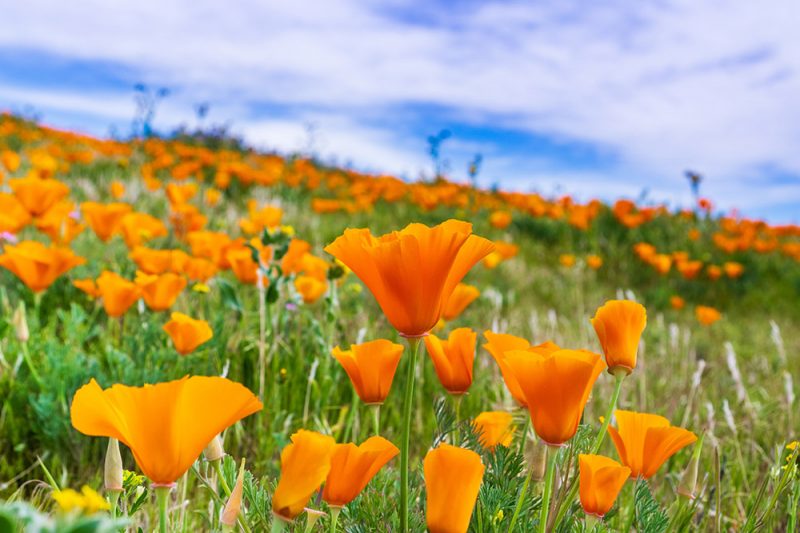
Close up of California Poppies (Eschscholzia californica) during peak blooming time, Antelope Valley California Poppy Reserve
According to Traditional Chinese Medicine (TCM), we are in the Heart “time of year,” early summer, meaning that the heart’s energy flourishes now. Herbs with a bitter flavor help the heart by clearing heat and toxins from the blood. In April I discussed the bitter flavor in herbs and gave several examples.
Cool in energy and bitter in flavor, California poppy is another example that specifically treats the heart as well as the liver. Yet, it has another property specific to the heart besides being bitter – it also calms the mind and nervous system. Both are especially helpful right now with pent up feelings from home isolation not to mention more stresses from COVID.
Overall, California poppy specifically treats anxiety, insomnia, and nervous tension. It is also used for restlessness, headache, toothache, and neuropathy. Children with nervousness and/or insomnia especially benefit from this mild herb.
But California poppy has even more uses for it also treats aches and pain (both internally and externally) as well as mild spasms of the respiratory, gastrointestinal and genitourinary tracts. As well it may be used to treat bed-wetting in children and diseases of the bladder and liver.
The Native Americans would make a strong tea of California poppy flowers to rinse the hair and kill head lice. Tribes in Mendocino, California, juiced the roots to treat a variety of ailments from headaches to stomachaches. They’d also wash the breasts of nursing mothers with the root juice to help dry the flow of milk when weaning babies.
A distant relative of the opium poppy, California poppy is not considered an opioid and poses no risk of addiction. It combines well with other herbs with which it is often found such as valerian, passionflower and hops.
 California Poppy Herb, Eschscholzia californica
California Poppy Herb, Eschscholzia californica
Family: Papaveraceae
Energy and flavors: Cool, bitter
Organs and channels affected: Liver, Heart
Chemical constituents: Isoquinoline alkaloids, including very small amounts of morphine and codeine; rutin, quercetin, isorhamnetin
Properties and actions: Nervine, sedative, febrifuge, antispasmodic, analgesic; calms Liver Wind, calms Heart Shen
Contraindications: Pregnancy (it is a uterine stimulant), nursing
Caution: In patients on sedatives or antidepressants
Dosage and preparation: Standard infusion. Tincture (1:2 @75% ABV fresh; 1:5 @50%ABV dry), 10-30 drops TID.
